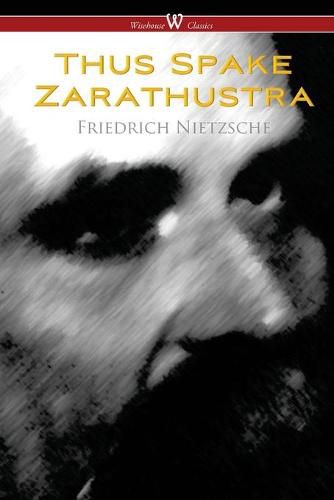Readings Newsletter
Become a Readings Member to make your shopping experience even easier.
Sign in or sign up for free!
You’re not far away from qualifying for FREE standard shipping within Australia
You’ve qualified for FREE standard shipping within Australia
The cart is loading…






This title is printed to order. This book may have been self-published. If so, we cannot guarantee the quality of the content. In the main most books will have gone through the editing process however some may not. We therefore suggest that you be aware of this before ordering this book. If in doubt check either the author or publisher’s details as we are unable to accept any returns unless they are faulty. Please contact us if you have any questions.
Thus Spoke Zarathustra: A Book for All and None (German: Also sprach Zarathustra: Ein Buch fur Alle und Keinen, also translated as Thus Spake Zarathustra) is a philosophical novel by German philosopher Friedrich Nietzsche, composed in four parts between 1883 and 1885 and published between 1883 and 1891. Much of the work deals with ideas such as the eternal recurrence of the same , the parable on the death of God , and the prophecy of the UEbermensch, which were first introduced in The Gay Science.
The book chronicles the fictitious travels and speeches of Zarathustra. Zarathustra’s namesake was the founder of Zoroastrianism, usually known in English as Zoroaster (Avestan: Zara ustra). Nietzsche is clearly portraying a new or different Zarathustra, one who turns traditional morality on its head.
Zarathustra has a simple characterization and plot, narrated sporadically throughout the text. It possesses a unique experimental style, one that is, for instance, evident in newly invented dithyrambs narrated or sung by Zarathustra. Likewise, the separate Dithyrambs of Dionysus was written in autumn 1888, and printed with the full volume in 1892, as the corollaries of Zarathustra’s abundance .
Some speculate that Nietzsche intended to write about final acts of creation and destruction brought about by Zarathustra. However, the book lacks a finale to match that description; its actual ending focuses more on Zarathustra recognizing that his legacy is beginning to perpetuate, and consequently choosing to leave the higher men to their own devices in carrying his legacy forth.
$9.00 standard shipping within Australia
FREE standard shipping within Australia for orders over $100.00
Express & International shipping calculated at checkout
This title is printed to order. This book may have been self-published. If so, we cannot guarantee the quality of the content. In the main most books will have gone through the editing process however some may not. We therefore suggest that you be aware of this before ordering this book. If in doubt check either the author or publisher’s details as we are unable to accept any returns unless they are faulty. Please contact us if you have any questions.
Thus Spoke Zarathustra: A Book for All and None (German: Also sprach Zarathustra: Ein Buch fur Alle und Keinen, also translated as Thus Spake Zarathustra) is a philosophical novel by German philosopher Friedrich Nietzsche, composed in four parts between 1883 and 1885 and published between 1883 and 1891. Much of the work deals with ideas such as the eternal recurrence of the same , the parable on the death of God , and the prophecy of the UEbermensch, which were first introduced in The Gay Science.
The book chronicles the fictitious travels and speeches of Zarathustra. Zarathustra’s namesake was the founder of Zoroastrianism, usually known in English as Zoroaster (Avestan: Zara ustra). Nietzsche is clearly portraying a new or different Zarathustra, one who turns traditional morality on its head.
Zarathustra has a simple characterization and plot, narrated sporadically throughout the text. It possesses a unique experimental style, one that is, for instance, evident in newly invented dithyrambs narrated or sung by Zarathustra. Likewise, the separate Dithyrambs of Dionysus was written in autumn 1888, and printed with the full volume in 1892, as the corollaries of Zarathustra’s abundance .
Some speculate that Nietzsche intended to write about final acts of creation and destruction brought about by Zarathustra. However, the book lacks a finale to match that description; its actual ending focuses more on Zarathustra recognizing that his legacy is beginning to perpetuate, and consequently choosing to leave the higher men to their own devices in carrying his legacy forth.